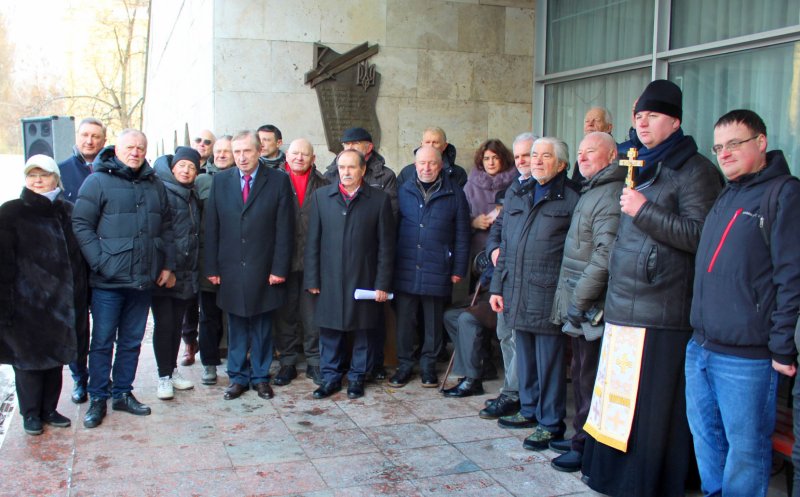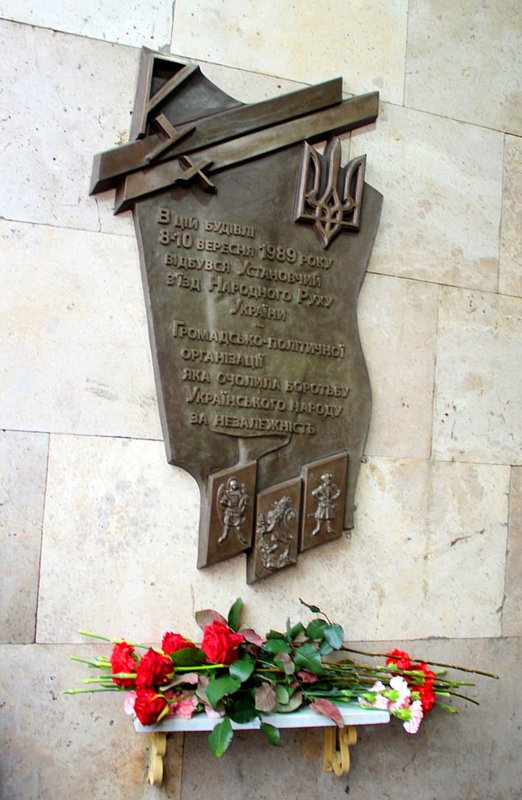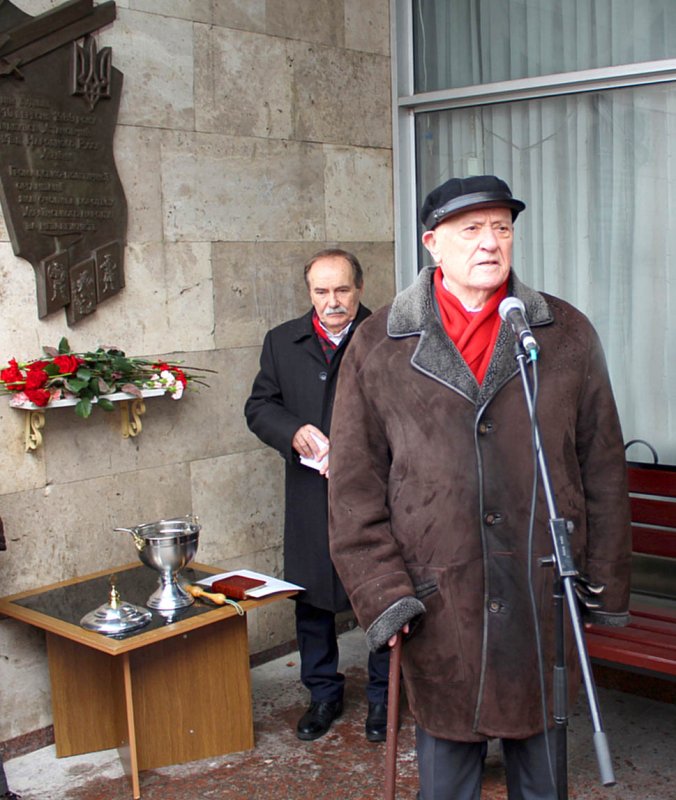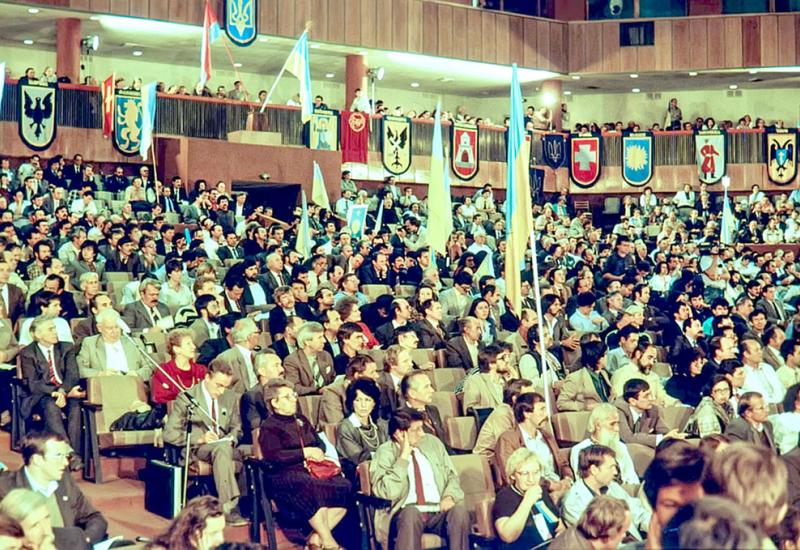In memory of the First Congress of the People's Movement of Ukraine
The unveiling of a memorial plaque dedicated to the First Congress of the People's Movement of Ukraine (PMU) at the entrance to the Center for Culture and Arts of Igor Sikorsky Kyiv Polytechnic Institute was not interrupted by air raids in Kyiv.
At the beginning of the event, which took place on the Day of Unity of Ukraine on January 22, Archpriest Taras Saliy, rector of the University Church of St. Nicholas the Wonderworker, held a prayer service for the salvation, preservation, and victory of Ukraine's defenders over Russian aggressors. He also expressed the opinion that the memorial plaque will remind future generations of Kyiv Polytechnic students of the dramatic, turning point changes in the history of modern Ukraine.
In his address to the participants of the celebration, Rector of Igor Sikorsky Kyiv Polytechnic Institute, Academician of the National Academy of Sciences of Ukraine Mykhailo Zgurovsky emphasized that it was the First Constituent Congress of the People's Movement of Ukraine, which took place in the conference hall of the Center for Culture and Arts of the KPI in September 1989, that laid the foundation for the further development of our sovereign state.
Those present at the opening ceremony, including Petro Talanchuk, rector of the Kyiv Polytechnic Institute in 1987-1992, one of the founders of the People's Movement of Ukraine, public and political figure, MP of five convocations Ivan Zayets, Ukrainian writer and journalist, politician, MP of five convocations Pavlo Movchan, academician of the National Academy of Sciences of Ukraine, writer, MP of two convocations Mykola Zhulynskyi, and others, played a significant role in organizing and holding the First Congress of the People's Movement of Ukraine.
...The cover has been removed from the memorial plaque. It reads: "On September 8-10, 1989, the Constituent Congress of the People's Movement of Ukraine, a socio-political organization that led the struggle of the Ukrainian people for independence, took place in this building." The author of the plaque is a young sculptor Oleksandr Kuzmin, and the funds for its creation were provided by the president of the National Center "Minor Academy of Sciences of Ukraine" Stanislav Dovgyi.

Petro Talanchuk was invited to speak. He went from student to rector at the KPI and knows firsthand that in the late 1980s the institute's staff was an active supporter of the democratic transformations that took place in the former Soviet Union. A vivid example of this was the support of the administration, scholars, teachers, and students for the processes of solidarity with supporters of democracy, because at that time Ukraine needed non-violent disobedience to the communist leadership and the abolition of the dominant role of the communist party. "...The activists faced the question of uniting socio-political forces in most regions of Ukraine at that time," said Talanchuk. This problem was faced by the participants of the constituent conferences of the regional organizations of the People's Movement of Ukraine in March-September 1989. Because of possible persecution of opponents of the Soviet regime by the government of the day, one of the founders of the NRU, the chairman of its Kyiv Coordination Council, writer Volodymyr Yavorivsky, asked the rector of the Kyiv Polytechnic Institute to allow the congress to be held in the hall of its Palace of Culture." Such permission was granted. And the First Constituent Congress of the People's Movement of Ukraine gathered 1121 delegates (out of 1158 elected) from 1247 centers from all over Ukraine. During the three days of September 1989, they adopted the Program and Statute of the People's Movement of Ukraine, elected its governing bodies, and so on.
"This was the beginning of democratic changes in our future sovereign state," said Petro Talanchuk, "Today's unveiling of the plaque is an extraordinary event, a symbol of the fact that, just like 35 years ago, we continue to shape the worldview of the people living in a sovereign state. But now it is time to unite the efforts of the entire society in the fight against the aggressor country, which is trying to wipe out a free and unshakable Ukraine from the surface of the planet. I am proud of my colleagues from my alma mater. The unveiling of the plaque is a continuation of good deeds for the sake of democratic change. I am confident that together with my colleagues we will soon form a team that will create a historical encyclopedia based on the national and statehood outlook of the citizens of independent Ukraine. It is time for modern historians not only to study the past, but also to shift attention from the question "what happened in the past?" to the question "what is happening in our present thanks to the past."

In his speech, Ivan Zayets expressed his gratitude for the support of the initiative to unveil the plaque. "Not everyone today realizes the complexity of the historical moment when the decision to hold the First Constituent Assembly of the NRU in the center of Kyiv was made. The fate of every scholar and teacher from the KPI administration of that time, headed by Petro Talanchuk, could have been easily destroyed by the Soviet government, because by assisting the organizers of the congress, they risked their own careers, even their freedom. It is a fact that spies from the then State Security Committee (KGB) closely monitored the activities of the Constituent Congress of the NRU."
In his speech, Ivan Zaiets expressed his gratitude for the support of the initiative to unveil the plaque. "Not everyone today realizes the complexity of the historical moment when the decision was made to hold the First Constituent Congress of the NRU in the center of Kyiv. The fate of every scholar and teacher from the KPI administration of that time, headed by Petro Talanchuk, could have been easily destroyed by the Soviet government, because by assisting the organizers of the congress, they risked their own careers, even their freedom. It is a fact that spies from the then State Security Committee (KGB) closely monitored the activities of the Constituent Congress of the NRU."
According to Ivan Zayets, the organizers of the First Congress included writers, scholars, and public figures O. Honchar, I. Drach, D. Pavlychko, P. Movchan, V. Yavorivsky, M. Horyn, L. Lukyanenko, V. Chornovil, M. Braichevsky, Y. Sverstiuk, V. Cherniak, and others. "...I can't list them all, but they are all the pillars of our nation," he continued, "These are people who throughout their lives protected the soul of their people and later unconditionally began to fight the Muscovite regime. Dozens of politicians who later adopted the Act of Independence of Ukraine came from the cohort of delegates to this congress." He also suggested that the university library and museum create an exhibition that would tell the story of the events that took place during the three days of September 1989.

The NRU became the newest form of self-organization of citizens in the struggle for their own state. It gave the Ukrainian people three unifying ideas: the idea of a nation-state, the idea of democracy, and the idea of a historical European civilizational choice, which crystallized into the slogan: "Let's bring Ukraine back to Europe." These ideas quickly took root in Ukrainian society. And this led to the proclamation of Ukraine's independence on August 24, 1991. "The state is a basic value for the nation," emphasized I. Zayets, "No one has ever helped us build a state. That is why we strongly reject the myth that Ukrainians were "granted" statehood. The sacrificial struggle of Ukrainians for their independence has always been characterized by continuity. The defense of the Motherland, further development and modernization of Ukraine should be based on continuity. The road to our statehood is the suffering path of a great nation. It is abundantly watered with the blood of millions of Ukrainian patriots who have been fighting for centuries, often with arms in hand, for the holy will. This is what the memorial plaque that has been unveiled today symbolizes."
In their addresses to the participants of the opening ceremony, the founders of the People's Movement of Ukraine, Pavlo Movchan and Mykola Zhulynskyi, emphasized that Ukrainians have always had a unifying idea, and that Unity Day was the crown of the liberation struggle. This was preceded, among other things, by the First Congress of the NRU.
In 1989, the Constituent Congress of the People's Movement of Ukraine, a socio-political organization that led the Ukrainian people's struggle for independence, took place at the KPI Center for Culture and Arts.
In honor of this historic event, a plaque was unveiled on the CCA building.

